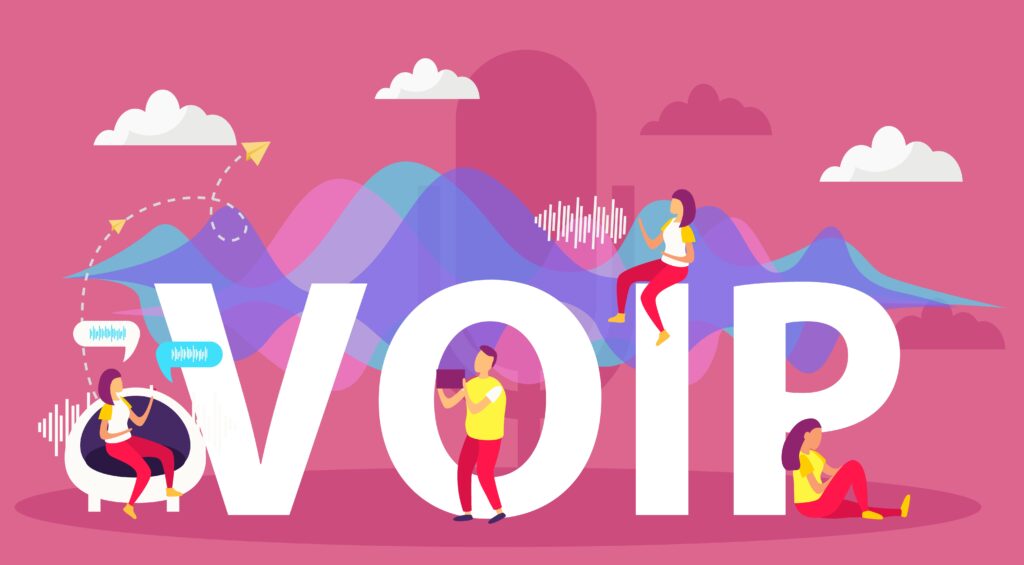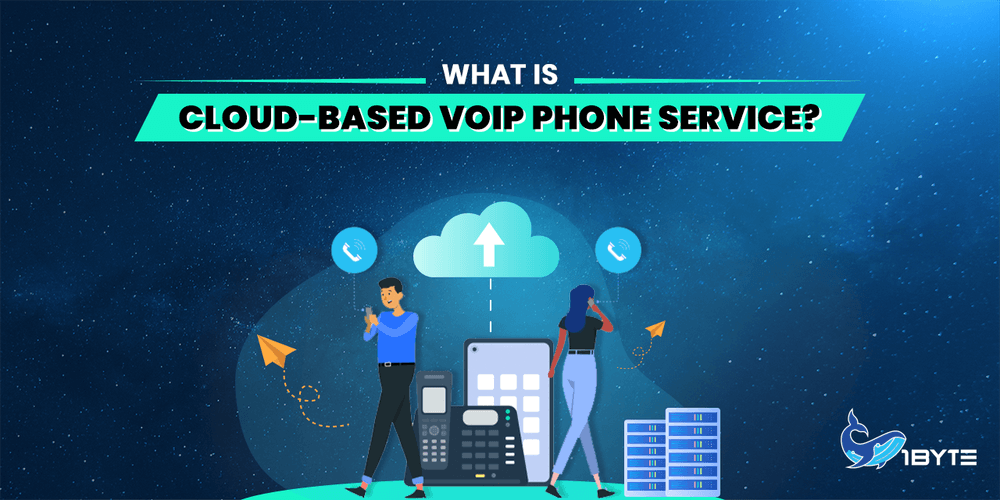Cloud-based VoIP phone systems are no longer a so-far technology. They are becoming more and more common and bringing changes in businesses. Let’s dive into the cloud-based telephone system, or maybe you have ever known it as “VoIP in the cloud”. In addition, we’ll also talk about cloud VoIP vs. On-Premise VoIP: what’s different and what’s better. The answers are right below!
What Is VoIP?
VoIP – Voice Over Internet Protocol – describes a telephone system based on the internet, or can be called a cloud calling service. It has exploded as a substitute solution for traditional desk phones and office phone lines. Why?

Because these cloud calling solutions have many conveniences that make changes, such as:
- Everywhere calls. Only with the internet, you can make or receive calls anytime and anywhere. You do not have to be strictly available at the offices to get a call.
- No limited devices. Smartphones, tablets, laptops, or desktop computers – just any one of those, you are free to VoIP in the cloud.
- One business phone number in many places. Anyone in your team can make and receive calls at their homes, at the offices, and even on the way.
Cloud VoIP vs. On-Premise Voip: What’s Different?
Cloud-based call center system is hosted at the VoIP provider’s data center. In comparison, traditional phone lines use phone system hardware, particularly a PBX, which is managed by the business and placed physically at the business’s location.
In detail, cloud calling services will integrate services from traditional phone systems and phone service providers, then connect to the data centers’ hardware. Not located and limited to business areas, the data centers are boundless with redundant power and high security.
Not just that simple, this primary difference gives the cloud-based VoIP phone systems many pros that make us change our minds.
FURTHER READING: |
1. Differences Between Business VoIP and Cloud Phone Systems |
2. Best Cloud Phone System and PBX Companies |
Cloud VoIP VS. On-Premise VoIP: What’s Better?
Now, let’s be ready to explore all the advantages that VoIP in the cloud can give.
1. Low Expenses
Regarding cost, cloud-based VoIP phone systems cost less than on-premise ones. Simply that, with on-premise telephone systems, businesses have to pay some additional operation costs, like:
- On-premise PBX
- Maintenance costs
- Add-ons features such as voicemail transcription, auto attendants, call queueing, and more.

Besides, both local and international calls are now much cheaper than ever before with cloud calling service, which is known as the biggest cons of On-Premise VoIP. So, the cloud-based call center system can be a go-to choice for businesses that aim to be cost-reduced in the communication budget.
2. Fast Setup
Let’s talk about the implementation of the traditional phone system first because it seems quite familiar to all of us. Devices, ports, and lines – all of them need to be prepared, installed, and connected to work. This might take a few days to weeks before everything is ready to run, depending on the system’s scale.
In another way, a cloud-based telephone system can clear up all those inconveniences. No more worry about the calling systems when you change business location or expand your business at any range.
No matter how quick or big your business changes, by using cloud calling solutions, you can connect with your clients and communicate as normal.
3. Reduce maintenance
Besides the upfront investment for the setup, businesses need to pay some additional fixed costs to monitor and maintain the system. This will take place throughout the process of use, consuming more human and financial resources. Businesses will need a team to monitor and be available anytime for any issues.
In contrast, the provider will help you out with details and management when using a cloud-based telephone system. You have questions – they answer; you get issues – they handle. This process totally takes place off-site and will be the provider’s priority and responsibility.
That is why good cloud calling solutions are better, along with great customer service. A 24/7 help desk will be more in need when people work and communicate around the clock. While saving several employees and expenses, businesses still always have support right there.
4. More Call Features
Obviously, VoIP calling solutions give you much more types of calls than just speaking and listening via the lines before. Here are some typical call features:
- Voicemail to email or text
- Call queues with on-hold music
- Call analytics and logs
- Custom caller ID
- Advanced call forwarding
- Automatic call recording
- One-click conference calls
- Multi-level auto attendants
More than that, feel free to add or customize call features without any hassles. Confusing jargon, hardware updates, or complicated requests – it is time you no longer care about these obstacles with VoIP phone systems.
Additional facts: The cloud-based telephone system is able to integrate with CRM, accounting software, or any other third-party tools. This will help you operate the business with one tool and will be a great support in digital transformation.
5. Upgrade Customer Service
The ability to call anywhere and anytime gives businesses more options to connect with customers. This is the pro of VoIP calling solutions making a significant impact on customer services lately.
Your team can make or receive calls from customers at their homes, which means that you can outsource the task instead of building an in-house team. This saves much cost and effort in the long run.

Moreover, with more call features mentioned above, your customer service will definitely be put at a higher level. Both businesses and customers have more methods and conveniences in communication.
6. Support Remote Work
Working from home makes business operations more flexible, and VoIP calling systems are great support that makes this change possible. Calling will not be an efficient method for communication in work with traditional desk phone lines.
One number can be used by many employees, and more call features and higher quality will help your team quickly clear the messages and exceptionally smooth the discussion.
Disadvantages of VoIP Phone System
Although it is difficult to deny the benefits of a cloud-based phone system, there are a few potential drawbacks to running your business phone system entirely over the internet.
1. Require Fast Networking Devices
The requirement for high-performance networking hardware, such as routers and switches, is one potential drawback of a cloud-based phone system.
Networks are divided, IP addresses are assigned, and network bandwidth is shaped by routers. The implementation of VoIP on a big scale may not work with older routers.
As more employees use computers and softphones, they will probably use a wireless connection as Wi-Fi doesn’t work well through walls. Your office can have some dead spots if you haven’t performed a wireless site audit.
2. Need High Quality Internet
The reliability and speed of the internet have both risen during the previous ten years. It’s not unusual for the majority of enterprises and household customers to have access to speeds of well over 100 Mbps. More than 1,000 VoIP calls could be supported by this at once.
Your cloud phone service, thankfully, doesn’t consume a lot of bandwidth. Your phone lines should each have an upload speed of at least 100 kbps.
Leverage 1Byte’s strong cloud computing expertise to boost your business in a big way
1Byte provides complete domain registration services that include dedicated support staff, educated customer care, reasonable costs, as well as a domain price search tool.
Elevate your online security with 1Byte's SSL Service. Unparalleled protection, seamless integration, and peace of mind for your digital journey.
No matter the cloud server package you pick, you can rely on 1Byte for dependability, privacy, security, and a stress-free experience that is essential for successful businesses.
Choosing us as your shared hosting provider allows you to get excellent value for your money while enjoying the same level of quality and functionality as more expensive options.
Through highly flexible programs, 1Byte's cutting-edge cloud hosting gives great solutions to small and medium-sized businesses faster, more securely, and at reduced costs.
Stay ahead of the competition with 1Byte's innovative WordPress hosting services. Our feature-rich plans and unmatched reliability ensure your website stands out and delivers an unforgettable user experience.
As an official AWS Partner, one of our primary responsibilities is to assist businesses in modernizing their operations and make the most of their journeys to the cloud with AWS.
Conclusion
The cloud-based telephone systems can be known as a breakthrough in the way we communicate. This transition saves businesses more cost, time, and effort. Besides such a lot of pros and features it owns, VoIP also makes changes in how we work and provide services.
Visit our cloud and domain service page to discover various package options.

